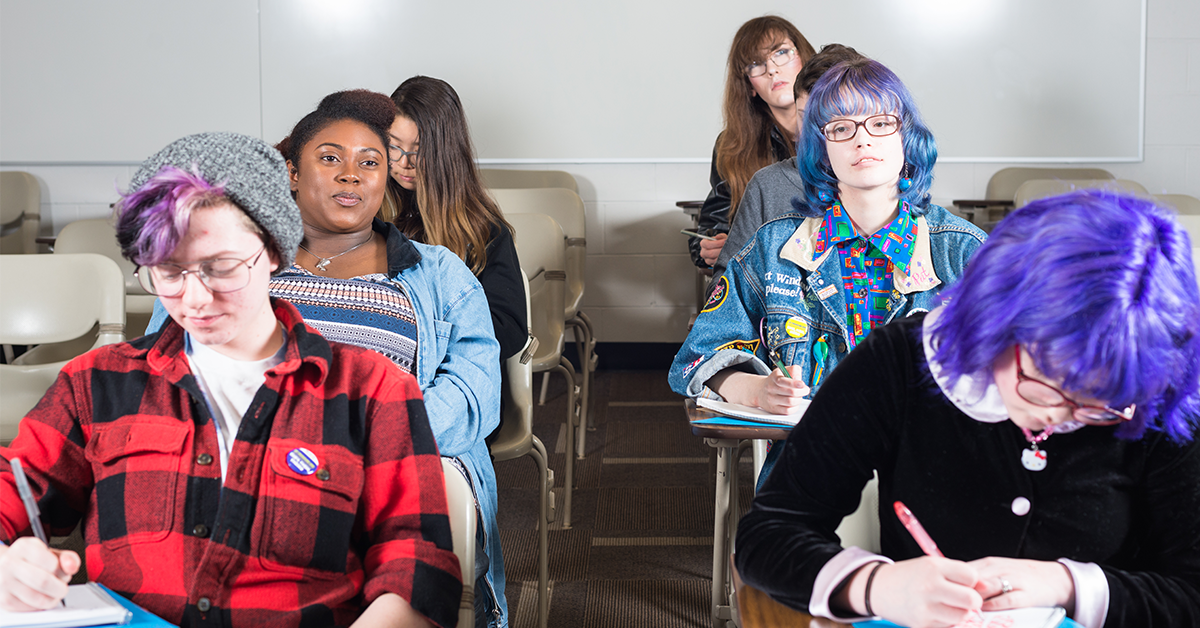Challenging Ableist Language
Challenging Ableist Language

OVERVIEW
Students will learn about ableism, ableist language, and how to act in allyship with people who have disabilities.
OBJECTIVES
Students will define
Students will identify ableist language.
Students will develop ways in which they can act in allyship with people who have disabilities.
THINGS TO PREP & TOOLS NEEDED
Computer or smartphone, Internet access, index cards, pens, printed copies of Doing Social Justice: 10 Reasons to Give Up Ableist Language.
TIME
45 minutes.
ALL ABOUT THE ACTIVITY
1. (5 minutes) Explain that today’s lesson will focus on ableism and how to avoid using ableist language.
Example: “Today we’re going to talk about ableism. Ableism is a system of oppression, like racism or sexism, that benefits able-bodied people at the expense of people with disabilities. When we say ‘disability,’ we can be referring to any number of conditions, including physical disabilities, such as deafness, blindness, or limitations in mobility, and intellectual disabilities. And when we say ‘ablebodied,’ we’re referring broadly to people who do not have any of these disabilities. Today we’ll talk about what ‘ableism’ means, how we might unintentionally perpetuate it, and ways to keep it out of our school.”
2. (5 minutess) Write these examples of ableist language on the board: The economy has been crippled by debt. You’d have to be insane to want to invade Syria. They’re just blind to the suffering of other people.
Ask students if they’ve ever heard someone use these ableist words or phrases. Explain that we often use words that are insulting to people with disabilities without realizing it.
3. (15 minutes) Pass out copies of Doing Social Justice: 10 Reasons to Give Up Ableist Language, an article by disability activist and writer Rachel Cohen-Rottenberg. In groups, students read the article and begin to answer some of the discussion questions.
- What are some initial reactions to the article?
- What is ableism? What is ableist language?
- How often do you unintentionally use ableist language? Before reading this article, had you ever thought about ability-related words in a critical way?
- Can you think of any specific examples of ableist language being used at school? What can our school do to bring attention to ableism at school?
- Why is it important for LGBTQ activists to have conversations about disability and ableism?
- In what ways do we benefit from combating ableism and celebrating a diverse range of ability in our school?
- What can we do to make our school a safer, more inclusive and more accessible space for students and adults with disabilities?
4. (5 minutes) Ask students to write down one ableist phrase they have used – even if the phrase wasn’t intended to be hurtful – and one ableist phrase they have heard others use at school. Students reflect on what that phrase might mean for people with disabilities. They write out action steps on how they are not going to use that word, and ways to intervene if they hear someone else saying that word.
5. (5 minutes) Closing: As a class, students brainstorm phrases to use or other ways to intervene when they hear someone using ableist language.
6. (10 minutes) As a whole group, students share some of the discussion questions, ending with “What can we do to make our school a safer, more inclusive and more accessible space for students and adults with disabilities?”
FOLLOW-UP/EXTENSIONS
1. Role-play using the phrases or actions the students develop to intervene when someone is using ableist language.
2. Research and celebrate people with disabilities throughout history.
- Virtual Museum of disABILITY.
- National Consortium on Leadership and Disability for Youth.
3. Include ableism in your curriculum and class discussions about other systems of oppression, such as racism, sexism, homophobia, etc.
4. Review alternatives to ableist language using this Glossary of Ableist Terms compiled by Lydia X. Z. Brown of the blog Autistic Hoya.
5. Create an action step guide that you can discuss with classmates and teachers to replace ableist words with non-ableist language.
TAGS
Ableism, language, accessibility, disability.
HANDOUTS.
Doing Social Justice: 10 Reasons to Give Up Ableist Language.
